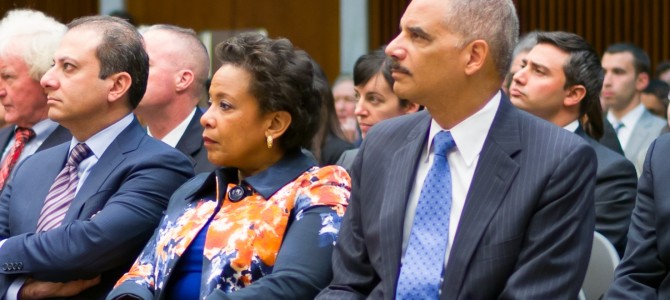
If President Obama’s nominee for attorney general, Loretta Lynch, gets appointed, she will continue the practice of her predecessor by expanding presidential power and the federal government, ultimately threatening the liberty of American citizens and the stability of the nation. It is the Senate’s constitutional duty to make sure that doesn’t happen.
Lynch supports Obama’s unconstitutional amnesty, believes illegal immigrants should have the same rights to employment as American citizens, opposes voter ID laws, advocates federal intrusion in local law enforcement under the guise of civil rights, supports the government taking private property on flimsy grounds, and offers no opposition to using drones against American citizens.
It’s a Problem When the Top Law Enforcer Won’t Enforce Laws
Sen. Jeff Sessions says he opposes Lynch’s nomination because she supports Obama’s executive amnesty, which he says is “one of the most breathtaking exertions of executive power in the history of this country.”
“After Congress rejected the president’s favored immigration legislation,” Sessions said, “the White House met with the interest groups who had crafted that bill and implemented the major provisions of the legislation that Congress had rejected through executive fiat.”
The Attorney General’s Office of Legal Counsel issued the legal opinion that attempted to justify this run-around Congress, prompting Sessions at the outset of the nomination process to state that no senator should vote to confirm anyone for the top law enforcement job in America who supported the president’s unlawful actions.
“Congress must defend its constitutional role, which is clearly threatened,” Sessions argued. “Unfortunately, when asked [during the hearing] whether she found the president’s actions to be legal and constitutional, Ms. Lynch said that she did.”
Sessions was also concerned by Lynch’s unambiguous statement that “the right and the obligation to work is one that’s shared by everyone in this country regardless of how they came here. And certainly, if someone is here, regardless of status, I would prefer that they would be participating in the workplace than not participating in the workplace.”
Sen. David Vitter called her comments “crazy.” “The law is very clear on this fact that they do not have the right to work in the United States,” he said.
Vitter argued that Lynch is basically saying that illegal immigrants have the same right to work as citizens and green-card holders, which is not true.
Lynch also opposes voter ID laws, as does Holder, claiming that they disenfranchise minority voters.
“Fifty years after the march on Washington, 50 years after the Civil Rights Movement, we stand in this country at a time when we see people trying to take back so much of what Dr. King fought for,” Lynch said. “People try and take over the State House and reverse the goals that have been made in voting in this country.
“But I’m proud to tell you that the Department of Justice has looked at these laws, and looked at what’s happening in the Deep South, and in my home state of North Carolina [that] has brought lawsuits against those voting rights changes that seek to limit our ability to stand up and exercise our rights as citizens. And those lawsuits will continue.”
Loretta Lynch Supports Taking Over Local Law Enforcement
Both Obama and Holder have called voting ID laws, which require all citizens to have a photo ID to vote, racist or at least tainted by a “racial element.”
When it comes to civil rights in America, Lynch says there’s still more work to do, and she supports the work Obama and Holder have done. “[Nelson] Mandela and [Martin Luther] King knew we had to continue working, and I’d be remiss if I didn’t tell you, that under this president and under this attorney general, that the Department of Justice is committed to following through with those dreams.”
One way Holder is “following through with those dreams” and “banging the civil-rights drum” is by using faux civil-rights cases, such as those of Trayvon Martin and Michael Brown, to unleash Justice Department community organizers on state and local police departments. Under the department’s civil-rights scheme, more than 20 cities and their police departments are beholden to the Obama Justice Department, Andrew McCarthy writes at National Review.
In the same vein as Holder, Lynch has blamed law enforcement for racial tensions.
“Frankly, the onus is on law enforcement because we are the ones who have taken the oath to protect and to serve the people of this city,” Lynch said in 2000 as a federal prosecutor in Brooklyn. “And we are the ones who have the ability to change from within.”
Not everyone in law enforcement agrees with Lynch’s opinion. “Whatever has happened in America to cause these feelings of resentment, it’s not the failure of law enforcement,” said Jeff Roorda, business manager of the St. Louis Police Officers Association. Racial tensions are due to “decades of racial disparity and economic disparity. It’s not a problem with the police,” he added.
Lynch says people are afraid of law enforcement, and even after years of reduction in crime in New York, Lynch said she didn’t trust the numbers. “While crime is down, there is a large part of our community that still does not feel safe. And that means that law enforcement has not done its job, no matter what the numbers say.”
Lynch’s statements mimic those of Holder, who recently said he didn’t think people should have to fear the police, but there is distrust between people of color and law enforcement. “We’re not at a stage where I can honestly say, you know, truthfully say that if you’re a person of color, you should not be concerned about any interaction that you have with the police in the same way I can’t say to a police officer, you shouldn’t worry about what community you are being asked to operate in.”
To Confirm or Not to Confirm Loretta Lynch
Despite Lynch’s unwavering support of Holder’s positions and Obama’s lawlessness, Sen. Orrin Hatch inexplicably says he will support her nomination, even after admitting that the Justice Department is in “dire need of new leadership” because its decisions have been politicized for too long, and it has facilitated the president’s abuses instead of upholding the rule of law.
Sen. Rand Paul has taken the opposite view and says, “She’s going down.” He considers her unfit for the office, not only because of her views on civil rights, but because of her support of civil asset forfeiture—where the federal government takes private property without good reason—and her “non-answer” to Sen. Ted Cruz’ question about the use of drones to kill an American citizen on American soil.
“I’m concerned that a big part of her fame as a federal prosecutor was through civil forfeiture,” Paul said. “She was asked specifically about this by Sen. Lee, and her response was, ‘Oh, everything is fine, it’s done with a court order.’ She seems to not quite understand that innocent people are having their stuff taken by government–their cars, their money, their hotels, their stuff is being confiscated by government even if they’re never charged or even if they’re never convicted. She didn’t seem to grasp that point and this is a week after parts of the administration said they were not going to enforce some of the civil forfeiture.”
Paul added that her views on executive amnesty were even more troubling. “The separation of powers is probably the most important underpinning of our constitutional system. If her position is that the executive branch can write laws or amend laws, that would be a real problem with me.”
It’s also a real problem with Cruz, who has called on the Senate majority leader to halt confirmations of every nominee, executive and judicial, (except those vital to national security) until the president rescinds his unconstitutional amnesty.
Cruz said Lynch’s immigration views were “dangerous” and questioned whether Majority Leader Mitch McConnell should even have the chamber consider her nomination. McConnell has said he would, stating, “I can’t imagine any circumstance in which a president’s nominee for a Cabinet position would not be given a courtesy of a vote on the floor of the Senate.” This view is short-sighted and almost certainly guarantees that Lynch will be confirmed.
Cruz has urged his fellow Republicans to vote against Lynch. “If every Republican on the Judiciary Committee votes ‘no,’ Ms. Lynch’s confirmation will be defeated. Likewise, if Republican leadership chooses not to report the nomination to the floor, Ms. Lynch’s nomination will be defeated.
“If Republicans mean what we say when we oppose the president’s unconstitutional executive amnesty, then we should use every constitutional check and balance we have. One of the most potent checks and balances the Constitution gives the Senate is the power of confirmation.”
Sen. Lindsey Graham says not confirming Lynch is pointless because it will just leave Holder in charge. “Nobody is going to say that the executive order is illegal that President Obama appoints, so the idea that we would block an attorney general nominee until you’ve gotten somebody to agree with Sen. Cruz about the executive order is probably not feasible,” Graham said. “It ensures that Eric Holder stays in place for two years. It’s picking a fight that we can’t win.”
Senate Consent Is an Opportunity to Check Executive Power
But is rejecting Lynch simply a matter of picking a fight the Republicans can’t win? Not according to the Founders, who established the appointment clause as a check on executive power. The president has the authority to nominate, but he needs the consent of the Senate. If the Senate refuses to reject unqualified or unacceptable nominees, it will be abdicating its authority to the executive branch, further empowering a president who has already proved willing to overstep his legal boundaries.
The Senate’s active and responsible role in the appointment process is, as Alexander Hamilton said, “an excellent check upon a spirit of favoritism in the President, and would tend greatly to preventing the appointment of unfit characters from State prejudice, from family connection, from personal attachment, or from a view to popularity and, in addition to this, it would be an efficacious source of stability in the administration.”
The possibility of rejection, Hamilton said, would serve as a strong motive for the president to be circumspect and prudent in proposing a nominee.
The danger to his own reputation, and, in the case of an elective magistrate, to his political existence, from betraying a spirit of favoritism, or an unbecoming pursuit of popularity, to the observation of a body, whose opinion would have great weight in forming that of the public, could not fail to operate as a barrier to the one and to the other. He would be both ashamed and afraid to bring forward for the most distinguished or lucrative stations, candidates who had no other merit, than that of coming from the same State to which he particularly belonged, or of being in some way or other personally allied to him, or of possessing the necessary insignificance and pliancy to render them the obsequious instruments of his pleasure.
In other words, the president should submit nominees with fear and trepidation. There should be a sense of danger involved if he nominates someone who is unfit—either for personal or ideological reasons. It is up to the Senate, which has the responsibility to restrain the president, to use all its power to expose a nominee as being unable to protect the republic. And nothing threatens the republic more than the unchecked power of a lawless president—a lawlessness Lynch supports.
It is because of dangerous and unfit nominees, such as Lynch, that the Founders designed the appointment clause the way they did. The Senate has a great deal of leeway in the process. It has the authority to refuse a nominee for any reason (the Constitution doesn’t speak to any guidelines in this matter, leaving it open, though Hamilton insisted that the reasons should be “special and strong”).
The president has the advantage in this process, to be sure. He is the one who can nominate. The Senate cannot, and it is not in a position to advise him on nominations prior to making a choice. However, it is the job—no, the absolute duty—of the Senate to stop unacceptable nominees, even if that means the president will nominate another person just like the previous one. In that case, the Senate will reject that one as well—and on it goes.
“As to offices, the Senate has no other influence but a restraint on improper appointments,” James Iredell said at the North Carolina Ratifying Convention. “The President proposes such a man for such an office. The Senate has to consider upon it. If they think him improper, the President must nominate another, whose appointment ultimately again depends upon the Senate.”
Struggle Between the Branches Helps Secure Liberty
This conflict, this gridlock, is necessary to ensure that one branch of government does not gain power over another. The result should inevitably be a major struggle when two branches are at odds—even if that means dragging the situation out for months. The hope, in that process, is that the American people will be made aware of the conflict and exert pressure on one or both branches to make better choices.
“The only real security of liberty, in any country, is the jealousy and circumspection of the people themselves,” Iredell said. “Let them be watchful over their rulers. Should they find a combination against their liberties, and all other methods appear insufficient to preserve them, they have, thank God, an ultimate remedy. That power which created the government can destroy it.”
How can people be watchers over their rulers if one of the branches rubberstamps the unacceptable or unlawful actions of another without thoroughly bringing them to the public’s attention? In the case of the Lynch nomination, Graham might be right, and Obama will continue to nominate people who support his lawlessness, but if the Senate does its job, it will expose the president to the American people; they can then exert political pressure on him to correct himself. If the people decide they want someone as attorney general, like Holder, who supports executive unconstitutional actions, then there is nothing to be done. But they should at least be given the opportunity to be aware of the issues and see there are leaders in the Senate fighting for their liberty by upholding the rule of law. That opportunity will never be had if the Senate refuses to do its job.
The appointments clause in the Constitution (Article 2, Section 2, Clause 2) says, “The President … shall nominate, and by and with the advice and consent of the Senate, shall appoint Ambassadors, other public Ministers and Consuls, Judges of the Supreme Court, and all other Officers of the United States, whose Appointments are not herein otherwise provided for, and which shall be established by law” (emphasis added).
Gouverneur Morris of Pennsylvania said, “As the president was to nominate, there would be responsibility, and as the Senate was to concur, there would be security.” If the Senate simply approves the president’s nominee “out of courtesy” or because they will just get another nominee standing before them with similar views, they are refusing to protect the American people by failing to check the president.
The Founders saw the danger of too much power in the hands of the executive and established means to protect the republic from tyranny. George Mason asserted that giving the executive such power was “dangerous” because it would allow him influence over the judiciary department itself, further expanding his power.
Luther Martin of Maryland was concerned that if the president’s appointment powers were not checked, then the president would be king “in every thing but the name.” Martin pointed out that even though the president is chosen to serve for a limited time, if he is given the sole authority of appointments, he will have established lasting power through his appointees.
The power of the Senate to check the president in the appointment process is not something to ignore in the name of courtesy or pragmatism. It is a power to exert, and when faced with a nominee for attorney general who supports executive lawlessness, opposes voting ID laws, misapplies civil rights as they relate to local police departments, supports the federal government in taking private property, and has no qualms about using drones against American citizens, the Senate must act. Otherwise we have, as the Founders said, crowned a king in the halls of liberty.









